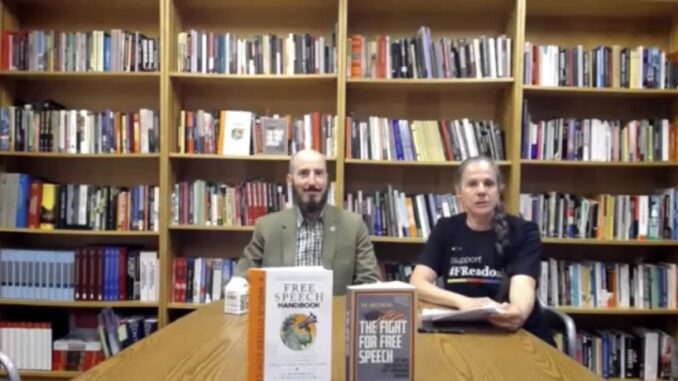
BY BRET BOTFELD
Author, Emmy-nominated documentary filmmaker, and Brooklyn College media law professor Ian Rosenberg discussed his book “The Fight for Free Speech,” on a Zoom meeting Monday evening. He introduced his publication as a handbook for combatting authoritarianism, protecting our democracy, and bringing an understanding of free speech law to all.
The first amendment protects government limits on our freedom of speech, but it doesn’t prevent a private employer from setting its own rules. This issue has caused confusion among advocates of free speech, according to Rosenberg.
One of the chapters in the book discusses whether or not Colin Kaepernick had the right to take a knee during the national anthem. His first protest occurred on August 14, 2016. It sparked a movement for NFL players fighting racial injustice. “I think Kaepernick is really the consummate protester of our age,” Rosenberg said.
“Kaepernick was working for a private employer, the NFL,” Rosenberg said, “and unfortunately I think this surprised many people, but you have almost no free speech rights in connection with a private employer.” Therefore, Kaepernick could not use the first amendment as an argument against the NFL.
The difference between public and private spheres extends to the world of education. Students at public schools can exercise their first amendment right to protest as opposed to students who attend private schools. “It’s another reason to appreciate CUNY,” said Brooklyn College Interim Provost, April Whatley who interviewed Rosenberg at the event.
In addition to the right to speak, there is a right to not have the government compel you to express a message you don’t believe in, Rosenberg said. Another case highlighted in the book, The Barnette Case, grants public school students the right to protest in a public space and prohibits public schools from forcing students to recite the Pledge of Allegiance.
Walter Barnette, Lucy McClure, and Paul Stull sued when their children were expelled from the Kanawha County schools for their refusal to salute the flag. They claimed that requiring participation in the ceremony violated their First Amendment rights. The Jehovah’s Witnesses challenged the regulations and won at trial. The state appealed to the U.S. Supreme Court, which in the 6-3 Barnette decision struck down the laws of all states requiring schoolchildren to salute the flag, according to The West Virginia Encyclopedia. “Students and people working for governmental agencies have greater rights than Kaepernick for the same purpose,” Rosenberg said.
The book was originally published February 9, 2021. Rosenberg released an updated version this spring.
- There is a right not to speak, and there is a right to not have the government compel you to express a message you don’t believe in.
- However, “if you are a student and you do the same protest and you take a knee, or the equivalent of at some public-school sponsored event, then The Barnette Case can be sighted. You can say there is no first amendment right that prohibits government actors from punishing you if you’re unwilling to express a message you don’t believe in,” Rosenberg said.
- The first amendment only protects you against government interference with your speech.
- and you do the same protest and you take a knee, or the equivalent of at some public-school sponsored event, then The Barnette Case can be sighted. You can say there is no first amendment right that prohibits government actors from punishing you if you’re unwilling to express a message you don’t believe in,” Rosenberg said.
- In comparison, you have essentially no free speech rights in connection with private schools along with private employers. “It’s another reason to appreciate CUNY,” Brooklyn College Interim Provost, April Whatley said.
